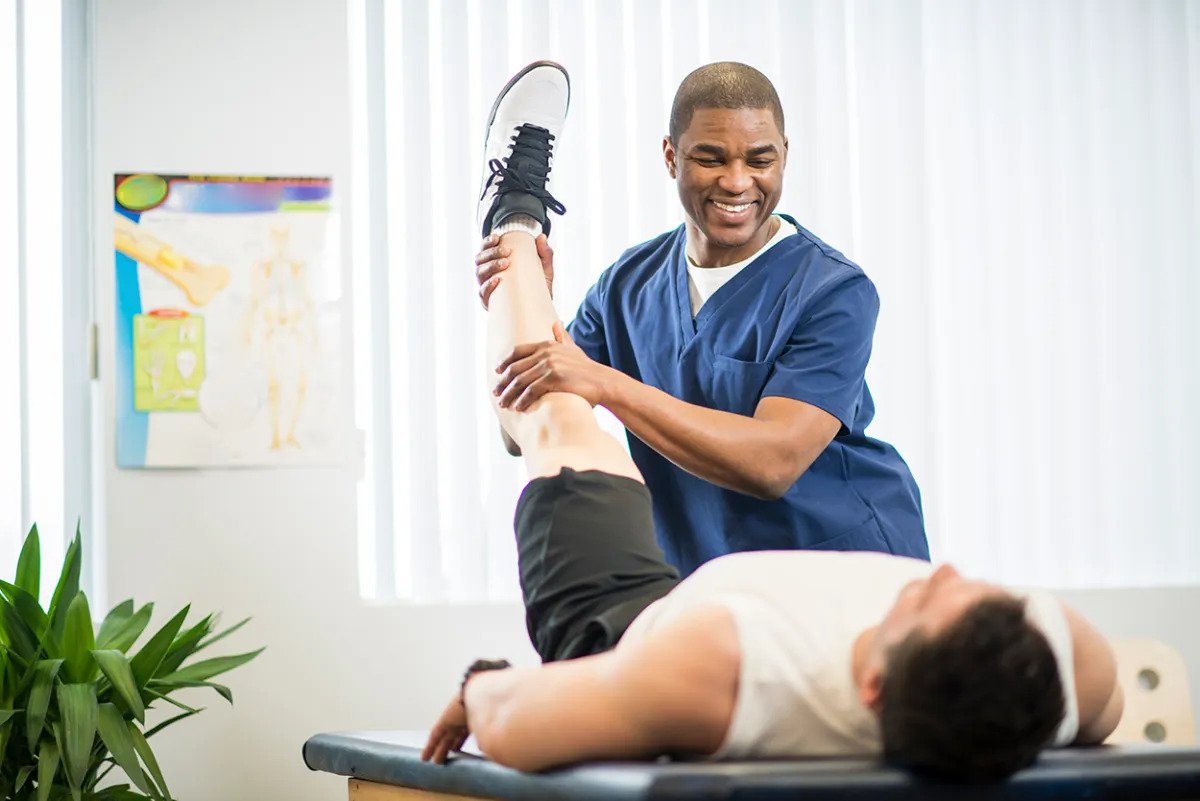
Physiotherapists help patients experiencing physical difficulties due to illness, injury, disability, or ageing by restoring and optimising their mobility and lowering the risk of future problems.
As an apprentice physiotherapist, you will help assess patients’ physical problems/disorders. Following a diagnosis, you will help develop and evaluate appropriate treatment regimens using several modalities, such as manual therapy, therapeutic exercise, and electrotherapy.
You will assist patients’ health and well-being, educate and advise them on how to avoid harm and self-manage long-term conditions, and treat them.
Patients include children, the elderly, individuals with sports injuries, acute care sufferers who need chest physiotherapy, and stroke patients.
Responsibilities
Throughout your apprenticeship, you may help:
- help patients with spine and joint problems
- help patients recover from accidents, sports injuries and strokes
- work with children who have mental or physical disabilities
- help older people with physical problems to become more mobile.
Salary
- Starting salaries for qualified physiotherapists (Band 5) range from £27,055 to £32,934. Agenda for Change (AfC) pay rates
- Senior physiotherapists can earn between £33,706 and £40,588 (Band 6).
- As a clinical specialist/team leader, you can earn between £41,659 and £47,672 (Band 7).
- Salaries for clinical lead physiotherapists are around £48,526 to £54,619 (Band 8a), rising to between £56,164 and £65,262 (Band 8b) for consultant physiotherapist roles.
- Salaries can rise to in excess of £67,064 (Band 8c) for management roles such as head of service.
Working hours
Physiotherapists typically work 35 to 40 hours a week, which may include evenings, nights and weekends.
Working environment
You could work at a hospice, at a client’s home, at a GP practice, at an adult care home, in an NHS or private hospital or at a fitness centre.
Qualifications
Qualifications you can achieve as an apprentice physiotherapist include:
- Level 6 Physiotherapist – Entry requirements for this level include 4 or 5 GCSEs at grades 9 to 4 (A* to C) and A levels, or equivalent, for a higher or degree apprenticeship. This qualification will take 48 months to complete.
Skills
On a physiotherapist apprenticeship, you’ll learn:
- knowledge of medicine and how the body works
- sensitivity and understanding
- to enjoy working with other people
- customer service skills
- patience and the ability to remain calm in stressful situations
- analytical thinking skills
- knowledge of psychology
- to be flexible and open to change
- to be able to use a computer and the main software packages competently.
Employers
You can work in a range of settings including the:
- public sector – public services and enterprises such as the NHS
- private sector
- third sector – includes charities, and voluntary and community groups.
The NHS is the major employer of physiotherapists. Your skills are needed in most departments, such as:
- elderly care
- intensive care
- mental health
- occupational health
- orthopaedics
- outpatients’ departments
- paediatrics
- stroke services
- women’s health.
Professional development
Once qualified, you will get clinical supervision on the job and mentoring support. In addition, attending briefings, short courses, and reflective practice programmes will encourage you to broaden your knowledge and skills. This helps you with your continuing professional development (CPD), which is necessary for HCPC registration renewal.
Flying Start NHS is a scheme for newly qualified physiotherapists in Scotland. This curriculum will assist you in learning throughout your first year of practice with NHS Scotland.
Membership in the CSP provides access to professional development resources and the ability to network with colleagues. In addition, the CSP includes details about post-qualifying courses and activities. These may range from one-day seminars to postgraduate certificates, degrees, and MSc qualifications in advanced physiotherapy, manual therapy, and sports therapy.
If you have at least two years of experience and are in a position with leadership duties or possibilities, you may also join the CSP Leadership Development Programme.
If you operate in private practice, consider becoming a member of Physio First, which provides a range of activities, resources, and business advice.
With experience, you can pursue more training in injectable therapy and supplementary or independent prescription areas. However, you must first finish an HCPC-approved prescribing training programme and have an annotation (mark) on your HCPC register record before you may prescribe. After that, you may prescribe any authorised drug that is within the ambit of physiotherapy prescribing practice. For further information, see the CSP – Medicine utilisation in physiotherapy practice.
After obtaining expertise via clinical practice and further training, you can graduate to a position in advanced practice. Experienced doctors may also enrol in an Advanced Clinical Practitioner apprenticeship (England), which combines work with an MSc in Advanced Clinical Practice. Finally, after you have worked as an advanced practice physiotherapist for a while, you may join the CSP Advanced Practice Physiotherapy Network (APPN).
Career prospects
You will have a clear career path if you work at an NHS hospital. You might start in a rotational job, working in several departments to get experience in different fields, such as outpatients and orthopaedics.
Following your first clinical experience, you may specialise in a particular area of practice, such as neurology, sports injuries, or critical care, or with specific patient demographics, such as the elderly, children, or cancer patients.
You can rise through the grading system to senior physiotherapist and clinical specialist/team leader jobs as you gain experience.
With further clinical experience and training, you can progress into advanced clinical practice and consulting employment with a high degree of autonomy. You will often work in specialised consultant clinics, evaluating, monitoring, and referring patients for surgical/medical treatments on behalf of orthopaedic, spinal, rheumatology, or medical consultants (if ward-based). Consultant jobs need extensive clinical and managerial experience.
There is also the possibility of progressing into management roles in physiotherapy services, with responsibility for strategy, budgeting, and staff or general health care management. Other feasible career avenues include teaching, training, and research.
